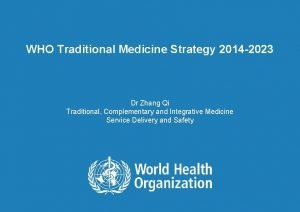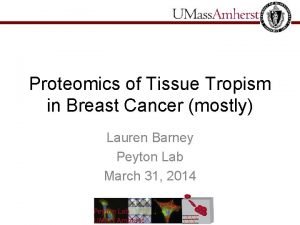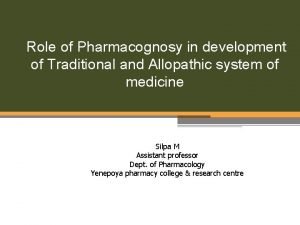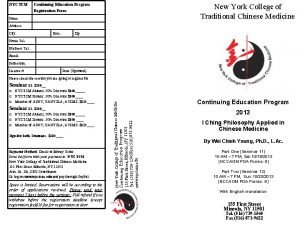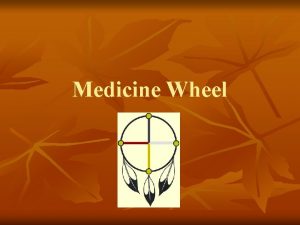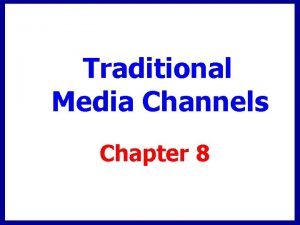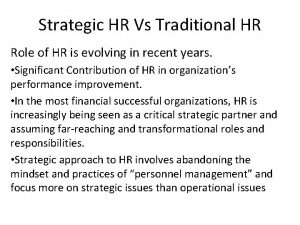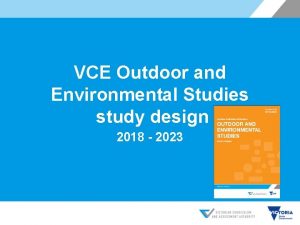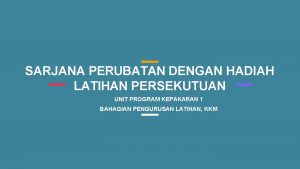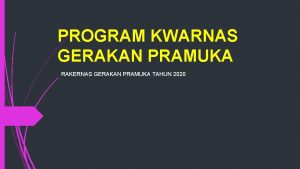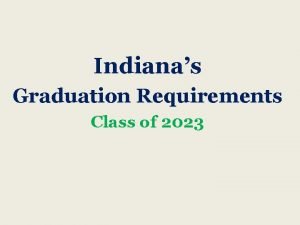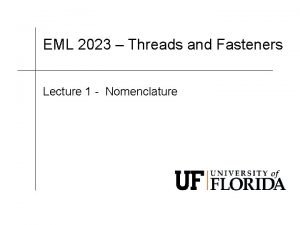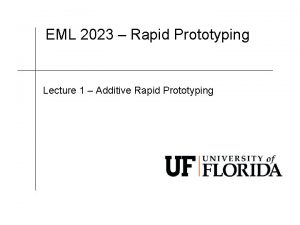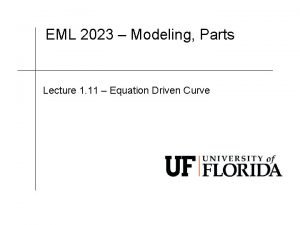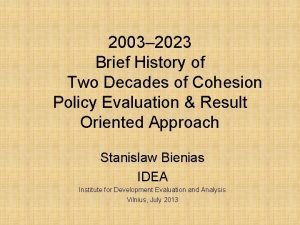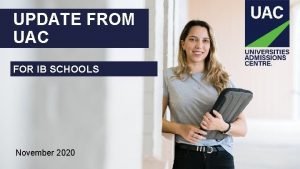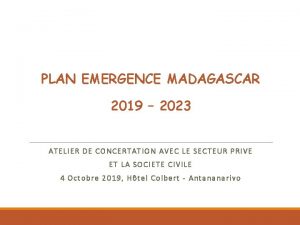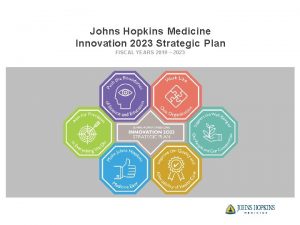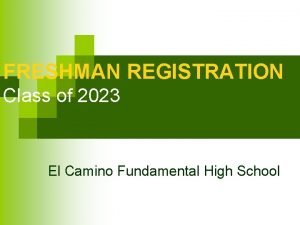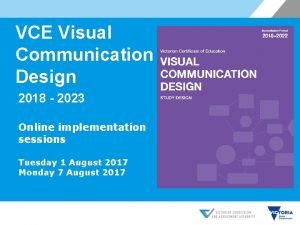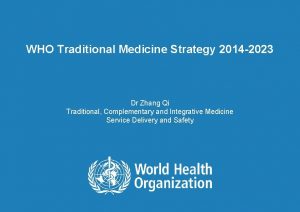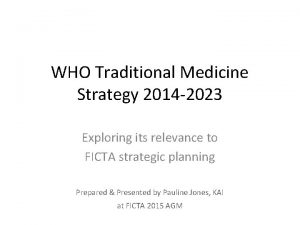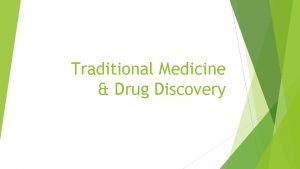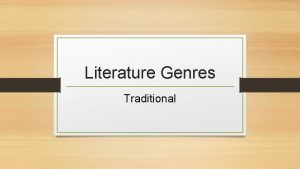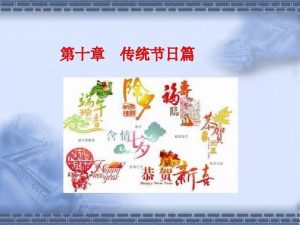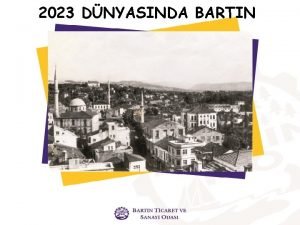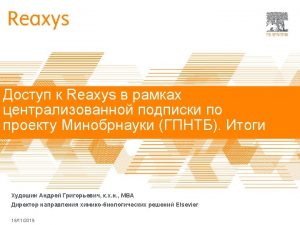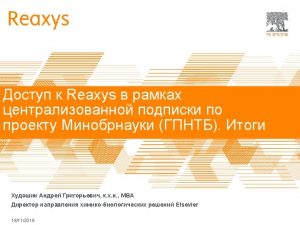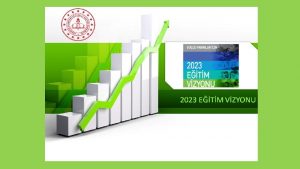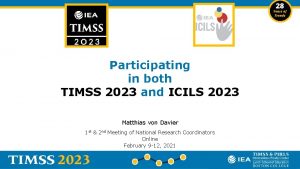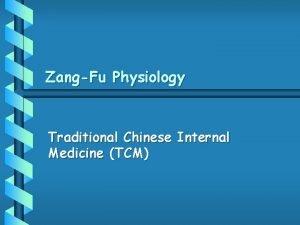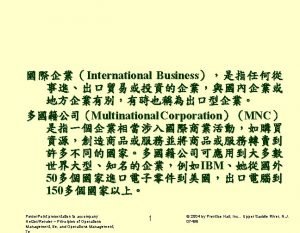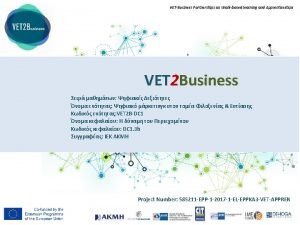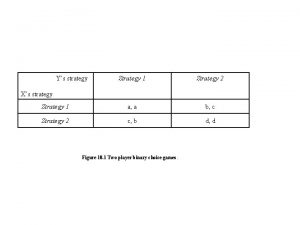WHO Traditional Medicine Strategy 2014 2023 Dr Zhang



























- Slides: 27

WHO Traditional Medicine Strategy 2014 -2023 Dr Zhang Qi Traditional, Complementary and Integrative Medicine Service Delivery and Safety Workshop on Integration of Traditional and Complementary Medicine Practices into Health Systems and Health Services, Istanbul, Turkey, 18 April 2018

Overview of my presentation l Global situation in T&CM l WHO TM strategy l Implementation of the strategy Workshop on Integration of Traditional and Complementary Medicine Practices into Health Systems and Health Services, Istanbul, Turkey, 18 April 2018

Demand need to T&CM l Over 100 million Europeans are currently T&CM users, with one-fifth regularly using T&CM and preferring health care which includes T&CM . There are many more T&CM users in Africa, Asia, Australia and North America. l In Australia, of those randomly interviewed, 68. 9% used at least one form of CAM in the past 12 months and 44. 1% visited CAM practitioners. l In US, a national health survey in 2007 revealed that more than $34 billion is spent on CAM annually and almost 4 out of 10 adults had used CAM. l In China, according to the recent national survey data, 907 million visits to traditional Chinese medicine – 18% of all medical visits; 13. 6 million traditional Chinese medicine inpatients – 16% of the total in all hospitals. l In India, There are 785 185 registered Ayurveda, Yoga, Naturopathy, Unani, Siddha and Homeopathy(AYUSH) practitioners and an estimated one million village-based, traditional AYUSH community health workers. Workshop on Integration of Traditional and Complementary Medicine Practices into Health Systems and Health Services, Istanbul, Turkey, 18 April 2018

Demand need to T&CM l An extensive number of patients with multiple sclerosis resort to complementary and alternative medicine treatments: prevalence of use ranges from 41 percent in Spain to 70 percent in Canada and 82 percent in Australia. l In China, the top five diseases for admission to traditional Chinese medicine hospitals: cerebrovascular accident, intervertebral disc displacement, haemorrhoids, ischaemic heart disease and essential hypertension. Workshop on Integration of Traditional and Complementary Medicine Practices into Health Systems and Health Services, Istanbul, Turkey, 18 April 2018

Demand need to T&CM Nearly a quarter of all modern medicines are derived from natural products, many of which were first used in a traditional medicine context. TM is thus a resource for primary health care, but also for innovation and discovery. Workshop on Integration of Traditional and Complementary Medicine Practices into Health Systems and Health Services, Istanbul, Turkey, 18 April 2018

Progress since 2002 in T&CM Workshop on Integration of Traditional and Complementary Medicine Practices into Health Systems and Health Services, Istanbul, Turkey, 18 April 2018

Regulation on practitioners in T&CM Regulations on T&CM practitioners (129) Country reports, 2012 Not answered 17 (13%) 129 56 (43. 5%) With no regulations on T&CM practitioners Workshop on Integration of Traditional and Complementary Medicine Practices into Health Systems and Health Services, Istanbul, Turkey, 18 April 2018 With regulations on T&CM practitioners

Education in T&CM Member States that provide T&CM education at university level Source: country report With T&CM at university level No T&CM education at university level 72 (56%) 129 18 (14%) Workshop on Integration of Traditional and Complementary Medicine Practices into Health Systems and Health Services, Istanbul, Turkey, 18 April 2018 Not answered

Challenges in T&CM Difficulties faced by Member States with regard to regulatory issues related to the practice of T&CM, multiple choice (129) Country reports, 2012 105 Lack of research data 83 Lack of mechanisms to control and regulate TM/CAM advertising and claims 78 Lack of appropriate mechanisms to control and regulate herbal products 75 Lack of appropriate mechanisms to monitor and regulate TM/CAM providers 68 Lack of financial support for research on TM/CAM 67 Lack of expertise within national health authorities and control agencies 65 Lack of mechanisms to monitor safety of TM/CAM practice Lack of cooperation channels between national health authorities to share information about TM/CAM 63 Lack of mechanisms to monitor safety of TM/CAM products, including herbal medicines 60 58 Lack of education and training for TM/CAM providers 15 Other 0 20 40 60 80 Number of Member States Workshop on Integration of Traditional and Complementary Medicine Practices into Health Systems and Health Services, Istanbul, Turkey, 18 April 2018 100 120

Challenges l Progress relating to regulation on herbal medicines is moving faster, while regulation on TM practice and practitioners is advancing at a slower rate. l Member States where lack of knowledge in formulating national policy has led to a lack of regulations on TM practice and practitioners as well as a lack of integration of TM services into health service delivery and self-health care. Workshop on Integration of Traditional and Complementary Medicine Practices into Health Systems and Health Services, Istanbul, Turkey, 18 April 2018

Member States & WHO Type of support for T&CM issues that Member States are interested in receiving from WHO, N=132 General technical guidance for research and evaluation of TM/CAM related to safety, quality and efficacy 67 30 63 Information sharing on regulatory issues 40 59 Provision of research databases 8 5 32 9 57 29 Seminar/workshop about integration of TM/CAM in the primary health care context 55 34 Seminar/workshop about national capacity to establish regulations for herbal medicines 54 28 Seminar/workshop on developing national policy and programmes for TM/CAM 53 31 Provision of guidelines or minimum requirements for basic training of TM/CAM providers 52 38 11 Seminar/workshop about national capacity to establish regulations on TM/CAM practice 52 37 14 Seminar/workshop about national capacity building on safety monitoring of herbal medicines 11 11 14 17 Great need Some need No need Arrangement of global meetings 49 38 Provision of technical support to promote safe and effective use of indigenous traditional medicine in Primary Health Care 48 38 38 Provision of cooperation channels between national health authorities Provision of guidance on self-care, information for the public in primary health care or at the community level 38 31 5 Other, 0 7 14 14 51 9 5 1 20 40 Workshop on Integration of Traditional and Complementary Medicine Practices into Health Systems and Health Services, Istanbul, Turkey, 18 April 2018 60 80 100 120

HSS->UHC->SDG SDGs (Impact) SDG 3: Equitable health outcomes and wellbeing; Global public health security and resilient societies SDG 1: No poverty SDG 4: Quality Education SDG 5: Gender Equality SDG 16: Inclusive societies SGD 8: Inclusive economic growth and decent jobs Achieve Universal Health Coverage UHC (Outcome) All people and communities receive the quality health services they need, without financial hardship Responsiveness Efficiency Fairness Quality Resilience HSS (Input/Output) T CI Service Workforce I TC Delivery I I TC Medical Products TC Infrastructure Financing Workshop on Integration of Traditional and Complementary Medicine Practices into Health Systems and Health Services, Istanbul, Turkey, 18 April 2018 Governance I TC Information I C T I TC

Universal Health coverage values and principles M C & T l M C Complementary Medicine Workshop on Integration of Traditional & and T Practices into Health Systems and Health Services, Istanbul, Turkey, 18 April 2018 T M C &

Health systems building blocks and outcomes M C & T M C T& M C & T CM & T M C & T Workshop on Integration of Traditional and Complementary Medicine Practices into Health Systems and Health Services, Istanbul, Turkey, 18 April 2018

Why TCI can contribute to UHC and SDGs l SDG: Ensure healthy lives and promote wellbeing for all at all ages l T&CM close to cultural, social, economical, environmental and spiritual elements – sustainable development l Equity and universal access in health: T&CM is more available, accessible, acceptable and affordable l OTCs and non-medication interventions l Elderly care and healthy industry Workshop on Integration of Traditional and Complementary Medicine Practices into Health Systems and Health Services, Istanbul, Turkey, 18 April 2018

Why TCI can contribute to UHC and SDGs Increasing practice and requests to WHO for policy and technical support on integrative medicine and care: l To provide support on appropriate policy in the integration of T&CM into health services particularly in PHC. l To provide support on appropriate regulation in ensuring safety, quality and effective use of integrative practice in T&CM with conventional medicine. l To provide support on appropriate training for providers in integrative practice to ensure the safety and quality of its services. l To provide technical support on interactions of herbal medicines with other medicines as increasing use of herbal medicines with drugs. l To provide support on cost effectiveness in the integrative approaches. Workshop on Integration of Traditional and Complementary Medicine Practices into Health Systems and Health Services, Istanbul, Turkey, 18 April 2018

Primary health care and TCI l Activities on 40 th anniversary of Alma Ata Declaration l The role of PHC in achieving UHC and SDGs l The role of TCI in PHC l The role of WHO TM strategy 2014 -2023 and relevant WHA resolutions Workshop on Integration of Traditional and Complementary Medicine Practices into Health Systems and Health Services, Istanbul, Turkey, 18 April 2018

WHO TM Strategy 2014 -2023: Goals l Harnessing the potential contribution of T&CM to health, wellness, peoplecentred health care and universal health coverage l Promoting safe and effective use of T&CM through the regulation, research and integration of T&CM products, practices and practitioners into the health system, as appropriate Workshop on Integration of Traditional and Complementary Medicine Practices into Health Systems and Health Services, Istanbul, Turkey, 18 April 2018

WHO TM Strategy 2014 -2023: Objectives and directions Build knowledge base • for management • through policies 2014 -2023 Strengthen quality • assurance, safety, proper use and effectiveness by • regulation Promote universal health coverage by integration • • understand recognize role and potential, build country profile strengthen knowledge base, build evidence and sustain resources products: monitoring, enforcement, harmonization practices and practitioners: education &training, skills development, services and therapies capitalize on potential contribution to improve health services and health outcomes informed choice about self-health care Workshop on Integration of Traditional and Complementary Medicine Practices into Health Systems and Health Services, Istanbul, Turkey, 18 April 2018

Implementation of WHO TM Strategy: Indicators for monitoring consumer education project/program for self-health care using T&CM national plan/ program/ approach for integrating T&CM service into national health service delivery a national/ provincial T&CM policy increased governmental/ public research funding on T&CM Member States reporting national/provincial regulation/ registration for T&CM practitioners national regulation for T&CM products national/ provincial regulation for T&CM practice Workshop on Integration of Traditional and Complementary Medicine Practices into Health Systems and Health Services, Istanbul, Turkey, 18 April 2018 WHO

WHA Resolution on Traditional Medicine WHA 67. 18 adopted in May 2014 urges Member States : l To adapt, adopt and implement, where appropriate, the WHO strategy as a basis for national T&CM programmes or work plans l To develop and implement working plans to integrate TM into health services particularly primary health care services l To report to WHO on progress in implementing the strategy Workshop on Integration of Traditional and Complementary Medicine Practices into Health Systems and Health Services, Istanbul, Turkey, 18 April 2018

WHA Resolution on Traditional Medicine WHA 67. 18 requests the Director-General of WHO: l To facilitate Member States’ implementation of the WHO strategy, supporting their formulation of knowledge-based national policies, standards and regulations, and strengthening national capacity building l To provide policy guidance to Member States on how to integrate T&CM services within health care systems l To provide technical guidance in ensuring safety, quality and effectiveness of T&CM services Workshop on Integration of Traditional and Complementary Medicine Practices into Health Systems and Health Services, Istanbul, Turkey, 18 April 2018

WHA Resolution on integrated, people-centred health services(2016) l Title: Strengthening integrated, people-centred health services l Urges WHO Member States to integrate where appropriate traditional and complementary medicine and modern health systems, based on national context and knowledge-based policies, while assuring the safety, quality and effectiveness of health services and taking into account a holistic approach to health Workshop on Integration of Traditional and Complementary Medicine Practices into Health Systems and Health Services, Istanbul, Turkey, 18 April 2018

Promote the contribution through : Leadership-Integration and Q&S l Support MS in their efforts in providing more health care choices to meet people’s needs and demands l Review and identify the existing models of appropriate integration in MS particularly in PHC to support IPCHS, UHC, SDGs and to report good practices l Quality improvement and safety of traditional, complementary and integrative medicine(TCI) services (starting in acupuncture) - keep the world safe and “do no harm” l Quality and safety on herbal medicines l Qualified TCI practitioners Workshop on Integration of Traditional and Complementary Medicine Practices into Health Systems and Health Services, Istanbul, Turkey, 18 April 2018

Promote the contribution through : Standards, norms and technical documents A series of Benchmarks for practice in TCI: l Benchmarks for practice in Acupuncture and in Cupping l Benchmarks for practice in Ayurveda l Benchmarks for practice in Panchakarma l Benchmarks for practice in Tuina l Benchmarks for practice in Unani Workshop on Integration of Traditional and Complementary Medicine Practices into Health Systems and Health Services, Istanbul, Turkey, 18 April 2018

Promote the contribution through: Traditional Medicine Chapter (Module 1) l Purpose: enable traditional medicine health services to count and be counted internationally. l Nature and scope: the chapter in its current form refers to disorders and patterns which originated in ancient Chinese medicine and are commonly used in China, Japan, Korea, Australia, America, Europe and elsewhere around the world. l It will be the case for creating a common language for this part of TM diagnosis and strengthening the integrative approach for improving people’s health. WHO EB progress report agreed and consensus reached in Tokyo ICD congress in 2016. Will be launched in June 2018. Workshop on Integration of Traditional and Complementary Medicine Practices into Health Systems and Health Services, Istanbul, Turkey, 18 April 2018

Integration of T&CM into national health systems Conventional medicine The patients and the public will be benefited from accessing more choices. Integrative medicine Workshop on Integration of Traditional and Complementary Medicine Practices into Health Systems and Health Services, Istanbul, Turkey, 18 April 2018 Traditional and complementary/ alternative medicine
 Health systems building blocks
Health systems building blocks Zhang et al 2014
Zhang et al 2014 Madar, kabab chini, tagar are the examples
Madar, kabab chini, tagar are the examples New york college of traditional chinese medicine
New york college of traditional chinese medicine Medicine wheel colors in order
Medicine wheel colors in order The traditional three-exposure hypothesis is based on:
The traditional three-exposure hypothesis is based on: Lepak and snell model
Lepak and snell model Outdoor and environmental studies
Outdoor and environmental studies Sec 3-2021
Sec 3-2021 Semakan keputusan hlp kkm 2021
Semakan keputusan hlp kkm 2021 Raimuna nasional 2023
Raimuna nasional 2023 Swiss snow happening 2023
Swiss snow happening 2023 Indiana high school graduation requirements 2023
Indiana high school graduation requirements 2023 Https://ibbw.kultus-bw.de/korrekturformulare
Https://ibbw.kultus-bw.de/korrekturformulare Clearance hole chart
Clearance hole chart Eml 2023
Eml 2023 Cameml
Cameml Abitur bayern 2023 termine
Abitur bayern 2023 termine 2023 - 2003
2023 - 2003 Ib to atar conversion 2020
Ib to atar conversion 2020 Aecp fy 2023
Aecp fy 2023 Mission statement delta sigma theta
Mission statement delta sigma theta Plan emergence madagascar 2019-2023 pdf
Plan emergence madagascar 2019-2023 pdf Innovation 2023
Innovation 2023 2023 el camino
2023 el camino Eet 2023
Eet 2023 Gymnaestrada 2023 amsterdam
Gymnaestrada 2023 amsterdam Vcaa visual communication design
Vcaa visual communication design
